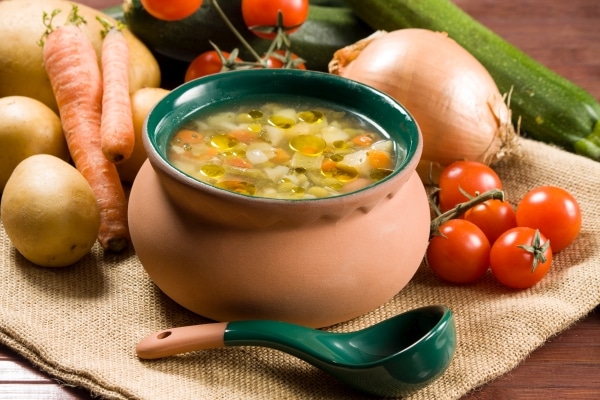What Is the Self Life of Hoe Canned Vegetable Beef Soup
Unopened vegetable broth lasts for months, but only a few days once you open it up. If those 3 to 4 days aren't enough for you, freezing the leftovers is an alternative worth considering.
If you're making homemade veggie broth, things aren't much different – you still have only a couple of days or freezing as your backup option.
Interested in learning a thing or two about storage, shelf life, and going bad of vegetable broth?
If so, this article is for you. Read on.
Note
In this article, I use the terms vegetable broth and vegetable stock interchangeably because everyone else does that as well. Technically, there isn't such a thing as veggie stock because stock is made with bone, and there is no such thing as "vegetable bones."
If you're interested only in a specific topic, feel free to jump right into it:
- Shelf life
- Spoilage
- Storage
- Freezing
- Vegetable Soup

How Long Does Vegetable Broth Last?
| Pantry | Fridge | |
|---|---|---|
| Vegetable broth (unopened) | Best-by + 1 – 3 months | |
| Store-bought vegetable broth (opened) | 4 – 5 days | |
| Homemade vegetable broth | 4 – 5 days |
Store-bought vegetable broth comes with a shelf life of 1 to 2 years and easily lasts for a couple of months past the printed date. Once you open the can or carton, the broth keeps for 3 to 4 days (maybe 5) in the fridge.
Homemade veggie broth also keeps for 3 to 4 days, although some suggest you can keep it for up to a week. I suggest you go with 4 days of refrigeration and freezing any extra leftovers you might have (more on freezing later on).
That's the gist of it when it comes to the shelf life of vegetable stock.
Tip
If you need your broth to last for a very long time, consider using bouillon cubes. They might not be the healthiest option, but they are convenient to use and easy to store.
Expiration Date
The date printed on canned or boxed vegetable broth is a best-by date, not an expiration date. It's about food quality, not safety.
It's the manufacturers saying that they guarantee the quality of their product up until that point in time. And that doesn't say anything about if or when the product will go bad.
Plus, boxed and canned food products (like beef broth or chicken broth) tend to last for a long time, way past the printed date.
How long past the printed date can you use vegetable broth, you ask?
There's no right or wrong answer. The broth should keep for at least 2 to 3 months, possibly much more. It depends on the ingredients, their quality, and how the broth is packaged.
In other words, every brand is different, and you need to find out yourself if yours is safe to use (more on that later) and if the quality is good enough.
Note
Some broths out there contain preservatives that help them retain quality. Others don't. The former usually keep their taste better past their date but are considered less healthy.

Homemade Vegetable Broth
Homemade vegetable broth lasts only 3 to 4 days, maybe 5 days if you're feeling particularly adventurous.
As I already mentioned, some sources suggest you can keep it for up to a week, but I'd recommend you follow the standard advice of 3 to 4 days of storage for leftover perishable foods.
In other words, homemade veggie broth isn't much different from an opened store-bought one, at least when it comes to storage practices and shelf life.
Does Vegetable Broth Go Bad?
Canned and boxed vegetable broths don't easily go bad the way dairy products do, but they don't keep quality forever either.
There are three things to consider here:
- storage time
- actual spoilage
- quality
When it comes to storage time, it's pretty simple. If your broth is open for more than 5 days, or is still unopened but way past what you're comfortable using (e.g., 9 months past printed date), you discard it.
Then it's time to look for signs of spoilage to make sure if yours is safe to use (more on that in a moment).
Last, you consider the quality. If the broth doesn't show any signs of spoilage but tastes kind of meh, you can throw it out for quality purposes.

How To Tell If Vegetable Broth Is Bad?
Here's what you need to check when making sure if your vegetable stock is safe to use:
- Container. If the broth is still unopened and the container is bulging, leaky, or puffed up, discard it. None of these are sure signs the broth is off, but it's bad more likely than not.
- Smell. If the liquid gives off an off, sour, or "funny" odor, it's time to let it go. That's the most common sign that's hard to miss in most cases. If you're unsure, ask someone else for a second opinion. If they aren't sure either, err on the side of caution.
- Appearance. Appearance changes aren't that often in broths, but it's always worth checking, especially if the leftovers already sit in the fridge for a few days. If there's any odd going on, throw out the broth.
- Taste. If everything up to this point seems to be fine, give the broth a taste to make sure. Eating a tablespoon or two won't make you sick, but might prevent you from making soup that tastes terrible. If it tastes off, it's done for.
If you're on the fence about any of the above, play it safe and assume the veggie broth is spoiled. Risking getting sick from eating an old broth is never a good idea.
How To Store Vegetable Broth
Store unopened veggie broth in a cool and dry place, away from heat sauces. A cabinet in the kitchen or a shelf in the pantry should do just fine.
Once you open the can or box, you need to refrigerate the leftovers.
If your broth comes in a resealable carton or bottle, all you need is to seal it and put it in the fridge. But if it's not resealable, pour the leftovers into a mason jar or plastic container. Or anything else that you can seal tightly.
That's about it when it comes to refrigerating vegetable broth.
Now, if those few days after opening aren't long enough for your needs, freezing the leftover broth is an option. Let's discuss that.
Can You Freeze Vegetable Broth?
You can freeze vegetable stock, both store-bought and homemade, and it freezes very well. In fact, many brands recommend freezing their veggie broth in case a whole can or box is too much for your needs.
The method is the same, no matter if you've bought the broth or cooked it yourself.
Here's how you freeze vegetable broth:
- Let the broth cool down if it's the homemade variety.
- Portion the broth. For easy defrosting, it's best to freeze it in amounts needed for a single meal (soup or otherwise). That's not an issue if you already know how you're going to use the leftovers. If you don't, you can use an ice cube tray or a muffin tin. This way, you'll end up with a bunch of small portions, and no matter how much broth you need, you can defrost that amount. Make sure to leave some headspace in each container.
- Label the containers. If you find it useful, add labels with names and dates to each container. That's especially helpful if you have other broths or similar liquids already in the freezer.
- Freeze the portions. If you're going with a freezer container, make sure it's sealed tightly.
- Repackage once frozen if needed. If you froze the broth in ice cubes, transfer the cubes into a freezer bag or container once they're frozen. Again, add a label with name and date if you like.
Done. Frozen veggie broth can last for months in the freezer, but some brands recommend using it within two months for the best flavor.
Tip
Freezing doesn't refresh an old broth. Your kind of stale veggie broth will taste just as good (or bad) after defrosting as it was before freezing.
Defrosting Vegetable Broth
There are two ways to go about thawing veggie broth. Each has its pros and cons.
Defrosting in the fridge
Thawing the broth in the refrigerator requires at least 4 to 6 hours (or overnight to be safe) but allows you to easily refreeze the leftovers if need be. Plus, if the broth is already in liquid form, warming it up for a soup doesn't take that long and doesn't require much supervision.
Defrosting on the stove
Using the stove is a great option if you're in a hurry. The whole operation takes less than 10 minutes (unless you're defrosting a ton of it), but requires a bit of supervision to make sure nothing burns.
Start on low heat so that the frozen block will start melting, and advance to medium only after you have a healthy (liquid at least covers the bottom) amount of broth defrosted.
Using Defrosted Veggie Broth
Once you thawed the broth, it's best to use it the same day. Two to three days is pretty much the most you can get until the broth is no longer safe to use.
If you have some leftovers that you won't use before that time, you can refreeze the broth.
If you defrosted it in the refrigerator, just transfer it back in the freezer, and you're good to go. But if you thawed it on the stove, make sure you cook it through first, before you freeze it again.
Vegetable Soup
So you made a soup with the broth, and you have some follow-up questions. Let's tackle those.
How Long Does Vegetable Soup Last?
Vegetable soup, just like veggie broth, stays safe for 3 to 4 days of cooking. Maybe 5 days if you're like me, but nothing more.
If that's not enough, once again, freezing comes to the rescue.
Can You Freeze Vegetable Soup?
You can freeze vegetable soup the same way you freeze veggie broth. And most of the soups out there freeze pretty well.
Now, there are a couple of things to remember to get the most out of your veggie soup:
- If possible, try undercooking the soup a bit so that the veggies don't end up completely mushy after you cook the soup again after defrosting.
- Add any fresh herbs only after defrosting the soup to get the most out of their flavor.
- Skip the noodles and add them only when you're reheating the soup. Noodles tend to absorb a ton of liquid, and noodle soups don't freeze that well. To mitigate that, we postpone adding noodles to when you're reheating the soup.
Source: https://www.doesitgobad.com/does-vegetable-broth-go-bad/
0 Response to "What Is the Self Life of Hoe Canned Vegetable Beef Soup"
Post a Comment